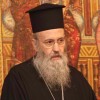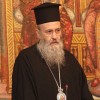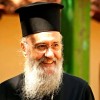All Christians, clerical and lay, have often become aware that if there is a burning topic and a great contemporary need, it is the need to acquire the mind of the Church. Our mind should be permeated by the mind of the Church. Our thought, life, mode of living, our desire, our will should be altered by the good alteration effected by the life of the Church.
The Apostle Paul urges, “Let this mind be in you which was also in Christ Jesus” (Phil. 2:5). But since the Church is not a human organization, but the holy and blessed Body of Christ, therefore we too are commanded to think with the catholic mind of the Church and be animated by the life of the Church, not to do anything apart from its life and teaching.
This is connected with two facts. One, that there are many Christians today who do not have the mind of the Church, that is to say, their mind is on “earthly things” (Phil. 3:19). Their mind is estranged from the mind of the Church; it is simply worldly. Their life is not in tune with the mind of the Church. The other fact is that acquiring the mind of the Church is related to the “making” of a man, which is connected with his deification. Insofar as the man has an unclean and darkened nous, he is an infant and a baby. To the extent that he grows in illumination of his nous, he also is made a man, which means that he is “Christified” and “made Church.”
In this perspective we can look at the Apostle Paul’s words: “When I was a child, I spoke as a child, I understood as a child, I thought as a child; but when I became a man, I put away childish things” (1 Cor. 13:11). If this passage is associated with what the Apostle said before and after it—where he was speaking of the “perfect” in relation to what is “in part” and about seeing God “face to face” in relation to “seeing in a mirror dimly”—then we can understand that the mind of the Church is connected with man’s spiritual fulfillment, which consists in partaking of the purifying, illuminating, and deifying energy of God.
A great deal is being said today about acquiring the mind of the Church.
Sometimes, however, we do not know just what the mind of the Church is. We identify it with a blind obedience to some general laws or else we connect it with outward things. We usually think that it is the mind of the Church when others accept us. But if they dare to cast doubt on our actions, we consider that they lack the mind of the Church. Thus we divide people as being of the Church or not, by external things and by characteristics which we construct according to our passions.
All the holy Fathers teach that man’s salvation is a combination of sacraments and asceticism. We cannot understand the sacraments without asceticism in Christ, and we cannot live a real ascetic life without the sacraments of the Church. Moreover, the whole life in the Church is an experience of a great mystery. Asceticism is in reality experience of the commandments of Christ which is attained by partaking in the purifying, illuminating, and deifying energy of God. Insofar as anyone experiences the purifying, illuminating, and deifying energy of God, he is experiencing rightly the sacramental life.
To have an Orthodox mindset (phronema) means a man’s complete turn of mind in all things, from the way he lives to the relationship he has with God. And literally, if the nous (spiritual intellect, “eye” of the soul) is darkened, then the whole mind is carnal. But if the nous is illuminated, which means that it has the Holy Spirit within it, then the whole mind is a mind of spirit and, of course, a mind of the Church.
When we speak of having an Orthodox mind, we mean chiefly that our nous is the nous of Christ, as the Apostle Paul says, or at least that we accept the experience of the saints and have communion with them. This is the way of the life of the Orthodox Tradition and the way of life of Christ’s life. The Orthodox mind is expressed by the dogmas of the Church, because, on the one hand, the dogmas express the life which the Church has and the revelation which the saints have received, and on the other hand, they lead the passionate people and the babes in Christ to unity and communion with God.
We must say at this point that the theology of the Church is ascetic, that is to say, it defines the methods of cure in order for man to attain deification. So the dogmas express the revelation and the life which the Church has, and they also cure man and lead him towards deification. They are spiritual road signs. In this sense we can say that the dogmas save man and sanctify him. This happens because they cure him and give him the right orientation on his way towards God.
From The Mind of the Church by Metropolitan Hierotheos Vlachos

















